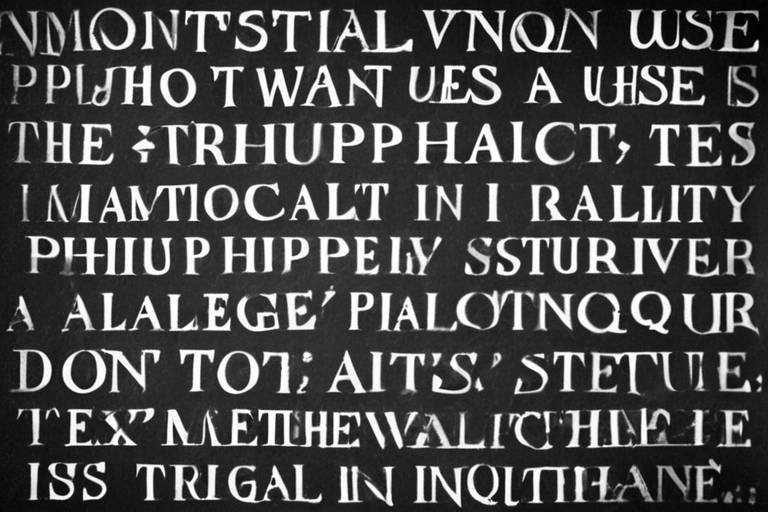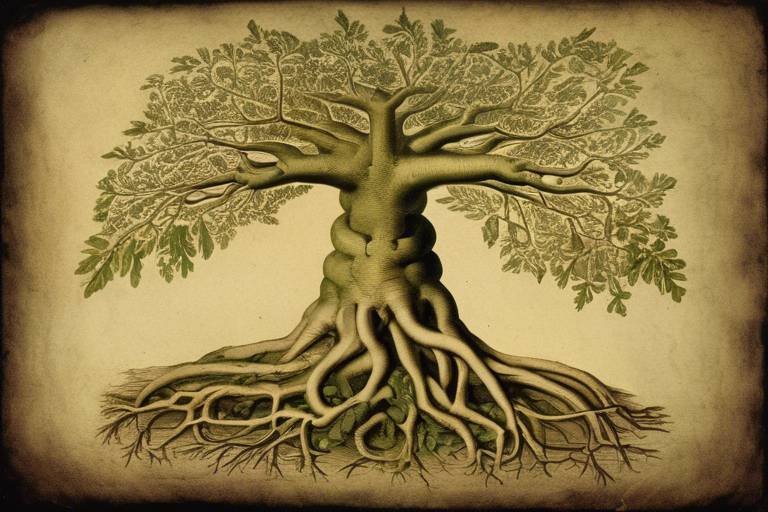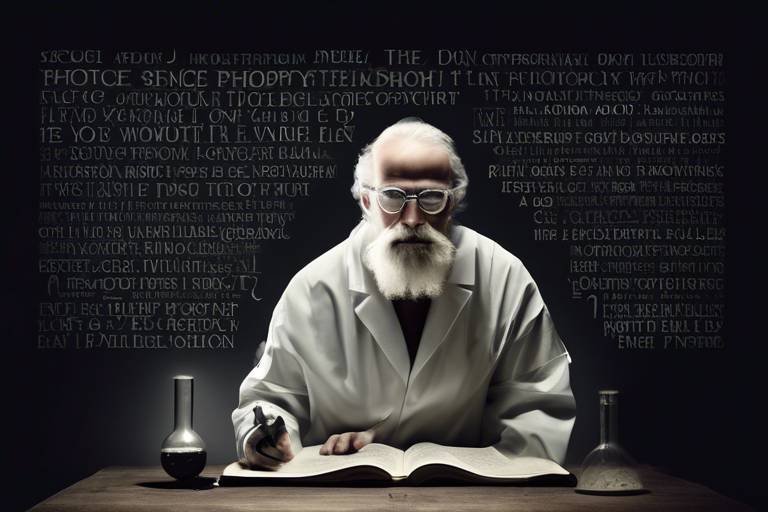The Nature of Reality - A Dialogue between Metaphysics and Quantum Physics
Have you ever pondered the question, "What is reality?" It's a concept that has perplexed thinkers for centuries, and today, we find ourselves at a fascinating crossroads where two seemingly disparate fields—metaphysics and quantum physics—come together to challenge our understanding of existence. Imagine standing on the edge of a vast ocean, looking out at the horizon where the sky meets the sea; this is akin to the exploration of reality that these disciplines embark upon. While metaphysics delves into the fundamental nature of being and the universe, quantum physics uncovers the bizarre behaviors of particles at the subatomic level. Together, they create a rich tapestry of inquiry that invites us to question everything we think we know about the world around us.
Metaphysics serves as the philosophical backbone of reality, probing deep into concepts such as existence, objects, and their properties, as well as the intricate nature of space and time. It asks questions like, "What does it mean for something to exist?" and "Is reality an objective truth or a subjective perception?" These inquiries lay the groundwork for understanding how we perceive the universe and our place within it. In contrast, quantum physics flips the script on traditional views, introducing principles that defy our classical intuition. Picture a world where particles can exist in multiple states at once or where two particles can be mysteriously connected across vast distances—this is the reality described by quantum mechanics.
As we dive deeper into this dialogue, we find that the interplay between metaphysics and quantum physics not only enriches our understanding of reality but also opens up new avenues of thought. For instance, the Uncertainty Principle proposed by Werner Heisenberg suggests that there are fundamental limits to what we can know about particles, hinting at a universe that is inherently unpredictable. This notion raises profound questions about determinism and whether our future is set in stone or shaped by the choices we make. Similarly, the concept of wave-particle duality challenges the very fabric of reality, prompting us to consider whether the universe is fundamentally probabilistic or deterministic.
In this ever-evolving landscape of ideas, the philosophical implications of quantum theory become increasingly significant. They challenge traditional metaphysical views and encourage us to reconsider the role of the observer in shaping existence. Are we merely passive witnesses to reality, or do our perceptions actively construct it? This question invites us to explore the depths of consciousness and existence, as both metaphysical and quantum perspectives offer intriguing insights into the nature of awareness and its impact on reality.
As we stand on the brink of new discoveries, the future of reality studies holds immense promise. With advancements in both metaphysics and quantum physics, we are likely to uncover new insights and frameworks that will enhance our understanding of existence. This journey is not just an academic pursuit; it is a deeply personal exploration that resonates with each of us. So, as we navigate this complex terrain, let us remain curious and open-minded, for the nature of reality may be more astonishing than we can ever imagine.
- What is the main difference between metaphysics and quantum physics? Metaphysics focuses on the fundamental nature of reality and existence, while quantum physics studies the behavior of particles at the microscopic level.
- How does quantum physics challenge traditional views of reality? Quantum physics introduces concepts like superposition and entanglement, which defy classical notions of causality and determinism.
- Can consciousness influence reality? Both metaphysical and quantum perspectives suggest that consciousness may play a role in shaping our perception of reality.
- What are the implications of the Uncertainty Principle? The Uncertainty Principle indicates that there are limits to our knowledge about particles, suggesting a fundamental unpredictability in the universe.
- Why is the study of reality important? Understanding reality helps us explore our existence, consciousness, and the nature of the universe, leading to deeper philosophical and scientific insights.

The Foundations of Metaphysics
Metaphysics serves as the philosophical backbone of our understanding of reality, tackling profound questions about existence, objects, and their properties. It invites us to ponder what it means to exist and how we can understand the world around us. Imagine standing on the edge of a vast ocean, where each wave represents a different concept of reality—each wave is unique, yet they all contribute to the greater body of water. This is akin to how metaphysics explores various facets of existence, including the nature of space and time.
At its core, metaphysics seeks to answer fundamental questions such as:
- What is existence?
- What are objects, and how do they interact?
- What is the nature of space and time?
These inquiries lead to a deeper understanding of reality that transcends mere physical observation. For instance, when we consider existence, we aren't just talking about the physical entities we can see and touch; we're also delving into abstract concepts like thoughts, emotions, and even the laws of nature. The interplay between these elements forms the rich tapestry of reality that metaphysics seeks to unravel.
Furthermore, metaphysics distinguishes between different types of existence. It categorizes entities into those that are concrete—like physical objects—and those that are abstract, such as numbers or ideas. This distinction is crucial as it helps us navigate our experiences and understand the principles that govern both tangible and intangible aspects of life. Just as a painter uses various colors to create a masterpiece, metaphysics uses different categories of existence to construct a comprehensive view of reality.
Another important aspect of metaphysics is its exploration of causality. The question of how one event leads to another is pivotal in both metaphysical and scientific discussions. Metaphysical theories often challenge our intuitive notions of cause and effect, suggesting that the relationships between events may not always be as straightforward as they appear. This complexity opens up a dialogue about the nature of reality itself—are we merely observers in a predetermined universe, or do we play an active role in shaping it?
In summary, the foundations of metaphysics lay the groundwork for understanding the intricate nature of reality. By examining existence, objects, and their properties, we gain insight into the fundamental principles that govern our lives. As we continue to explore these ideas, we find ourselves at the intersection of philosophy and science, where the mysteries of the universe await our discovery.

Quantum Physics: An Overview
Quantum physics is nothing short of a revolution in our understanding of the universe, a field that turns the classical laws of physics on their head. Imagine a world where particles can exist in multiple states at once, where the act of observation can alter reality itself. This is the bizarre yet fascinating realm of quantum mechanics, where the rules that govern the microscopic world diverge sharply from our everyday experiences. At its core, quantum physics seeks to explain the behavior of matter and energy at the smallest scales, fundamentally challenging our perceptions of reality.
One of the most striking features of quantum physics is its introduction of concepts like superposition and entanglement. Superposition allows particles to exist in multiple states simultaneously until measured, akin to a spinning coin that is both heads and tails until it lands. Entanglement, on the other hand, describes a phenomenon where particles become interconnected in such a way that the state of one instantly influences the state of another, no matter the distance separating them. This leads to the mind-boggling idea that information can be shared faster than the speed of light, defying our traditional understanding of causality.
To grasp the essence of quantum physics, we must also explore its fundamental principles, which serve as the building blocks of this intriguing field. These principles include:
- Wave-Particle Duality: Particles such as electrons exhibit both wave-like and particle-like properties, depending on how they are observed.
- The Uncertainty Principle: Proposed by Werner Heisenberg, it states that certain pairs of physical properties, like position and momentum, cannot be simultaneously measured with arbitrary precision.
- Quantum Tunneling: This phenomenon allows particles to pass through barriers that, according to classical physics, they should not be able to cross.
These principles not only redefine our understanding of the microcosm but also challenge the very fabric of reality as we know it. For instance, the idea of wave-particle duality leads to profound questions: Are we merely observers in a universe that exists independently of our perception, or does our observation play a crucial role in shaping reality? This line of inquiry blurs the boundaries between physics and philosophy, inviting us to reconsider our assumptions about existence.
Furthermore, the implications of quantum physics stretch far beyond the laboratory. They permeate various fields such as technology, where quantum computing promises to revolutionize data processing, and even philosophy, prompting discussions about the nature of consciousness and reality. As we stand on the precipice of this new understanding, it becomes clear that quantum physics is not just a scientific discipline; it is a gateway to a deeper comprehension of our existence and the universe.

Key Principles of Quantum Mechanics
Quantum mechanics is a fascinating field that reshapes our understanding of the universe at its most fundamental level. It introduces concepts that seem to defy our everyday experiences and challenge our intuitive grasp of reality. Two of the most pivotal principles in quantum mechanics are the Uncertainty Principle and Wave-Particle Duality. These principles not only revolutionize physics but also have profound philosophical implications that resonate with metaphysical discussions.
The Uncertainty Principle, formulated by Werner Heisenberg, posits that there are inherent limits to how precisely we can know certain pairs of properties of a particle, such as position and momentum. To illustrate this, imagine trying to pinpoint the exact location of a moving car while also measuring its speed. The more accurately you measure its location, the less accurately you can know its speed, and vice versa. This principle suggests that the universe has a built-in unpredictability, which challenges traditional metaphysical views of determinism—the idea that every event or state of affairs is determined by preceding events in a predictable manner.
On the other hand, Wave-Particle Duality reveals that particles, such as electrons and photons, can exhibit both wave-like and particle-like properties depending on how they are observed. When we think of light, we often envision it as a wave, spreading out and exhibiting interference patterns. However, when we measure light, it behaves like a stream of particles. This duality leads to a profound question: is reality inherently probabilistic, as quantum mechanics suggests, or is it deterministic, as classical physics would have us believe? This ongoing debate not only captivates physicists but also philosophers, as it questions the very nature of existence itself.
Understanding these principles is crucial for grasping how quantum mechanics interacts with metaphysical concepts. For instance, the implications of the Uncertainty Principle can lead us to reconsider the nature of causality and free will. If outcomes are fundamentally uncertain, can we truly claim to have control over our actions? Similarly, the concept of Wave-Particle Duality forces us to confront the role of the observer in shaping reality. Does our act of observation influence the state of a particle, or is it merely revealing an aspect of reality that exists independently of us?
As we delve deeper into the realms of quantum mechanics, we find ourselves at a crossroads where science meets philosophy. The dialogue between these two disciplines is not just an academic exercise; it has the potential to reshape our understanding of reality itself. By examining the key principles of quantum mechanics, we open the door to a profound exploration of existence, consciousness, and the very fabric of the universe.
- What is the Uncertainty Principle? - It states that certain pairs of properties, like position and momentum, cannot be simultaneously known to arbitrary precision.
- What does Wave-Particle Duality mean? - It means that particles can exhibit properties of both waves and particles, depending on how they are observed.
- How do these principles affect our understanding of reality? - They challenge traditional notions of determinism and suggest that observation may play a key role in shaping reality.
- Can quantum mechanics and metaphysics coexist? - Yes, the interplay between quantum mechanics and metaphysics offers rich insights into the nature of existence and consciousness.

The Uncertainty Principle
The Uncertainty Principle, formulated by the brilliant physicist Werner Heisenberg, is one of the cornerstones of quantum mechanics. It posits a fundamental limit to the precision with which certain pairs of physical properties, known as complementary variables or conjugate variables, can be simultaneously known. Imagine trying to take a photograph of a moving car; the more you focus on capturing its precise location, the less you can discern about its speed. This is akin to what happens at the quantum level, where the act of measuring one property inevitably disturbs another.
To put it simply, the Uncertainty Principle reveals that at a quantum level, reality is not as straightforward as we might hope. It challenges our classical intuition, suggesting that particles do not have definite positions or velocities until they are measured. This leads to a fascinating conclusion: the universe is inherently unpredictable. For example, if you were to measure the position of an electron, you would find it in a specific location, but you would lose all information about its momentum. Conversely, if you measure its momentum, its position becomes uncertain.
The mathematical expression of the Uncertainty Principle can be represented as follows:
| Property | Uncertainty Relation |
|---|---|
| Position (Δx) | Δx * Δp ≥ ℏ / 2 |
| Momentum (Δp) | Δp m * Δv |
In this equation, Δx represents the uncertainty in position, Δp represents the uncertainty in momentum, and ℏ (h-bar) is the reduced Planck's constant. This relationship illustrates that as we attempt to reduce the uncertainty in one property (like position), the uncertainty in the other property (momentum) increases correspondingly. This duality is not merely a limitation of our measuring instruments but rather a fundamental characteristic of nature itself.
The implications of the Uncertainty Principle extend beyond the realm of physics into the philosophical domain, igniting debates about determinism and free will. If particles exist in a state of probability rather than certainty, does that mean our understanding of causality is also flawed? Are our actions predetermined, or do we possess the freedom to choose? These questions reflect the profound impact of quantum mechanics on our understanding of reality.
Moreover, the Uncertainty Principle has significant repercussions in various fields, including technology and philosophy. For instance, advancements in quantum computing and cryptography leverage these principles to create systems that are more secure and efficient than ever before. As we unravel the mysteries of the quantum world, we find ourselves at the cusp of a new era in science, where the boundaries between reality and perception blur.
In conclusion, Heisenberg's Uncertainty Principle is not just a scientific concept; it is a gateway to understanding the complex and often paradoxical nature of reality. It compels us to reconsider our beliefs about existence, knowledge, and the universe itself, inviting us to embrace a world where uncertainty reigns and possibilities abound.
- What is the Uncertainty Principle?
The Uncertainty Principle is a fundamental concept in quantum mechanics that states it is impossible to precisely know both the position and momentum of a particle simultaneously.
- Who formulated the Uncertainty Principle?
The principle was formulated by physicist Werner Heisenberg in 1927.
- What are the implications of the Uncertainty Principle?
The implications include challenges to classical notions of determinism, suggesting that at a fundamental level, the universe is inherently unpredictable.

Wave-Particle Duality
Wave-particle duality is one of the most fascinating concepts in quantum physics, and it serves as a bridge between the world of the very small and our everyday experiences. Imagine a world where particles, the tiny building blocks of everything around us, can behave both like waves and like particles. This dual nature challenges our traditional understanding of reality and forces us to reconsider what we think we know about the universe.
At its core, wave-particle duality suggests that particles such as electrons and photons do not fit neatly into the categories we've created. Instead of being strictly one or the other, they exhibit characteristics of both waves and particles depending on how we observe them. For instance, when we are not measuring or observing them, they behave like waves, spreading out and existing in multiple states simultaneously. However, once we make an observation, they "collapse" into a specific state, behaving like particles. This phenomenon raises profound questions: What does it mean to observe something? Is reality dependent on our perception?
To illustrate this concept, consider the famous double-slit experiment. When light or electrons are directed at a barrier with two slits, they create an interference pattern on the other side, indicating wave-like behavior. However, if we attempt to measure which slit a particle goes through, the interference pattern disappears, and the particles behave like discrete entities. This experiment beautifully encapsulates the essence of wave-particle duality and highlights the role of the observer in shaping reality.
Here's a simple table summarizing the key differences between wave-like and particle-like behavior:
| Characteristic | Wave Behavior | Particle Behavior |
|---|---|---|
| Nature | Continuous | Discrete |
| Interference | Can create patterns (e.g., light waves) | No interference patterns |
| Measurement | Exists in multiple states | Collapses into a single state |
This duality poses a challenge to our classical understanding of reality. Are we living in a universe that is fundamentally probabilistic? Or is there an underlying order that we simply do not yet understand? The implications extend beyond physics, touching on philosophy, consciousness, and the very nature of existence itself. As we delve deeper into the mysteries of quantum mechanics, the questions surrounding wave-particle duality invite us to explore the limits of human knowledge and the nature of reality.
- What is wave-particle duality? Wave-particle duality is the concept that particles can exhibit both wave-like and particle-like properties depending on how they are observed.
- How does the double-slit experiment demonstrate wave-particle duality? The double-slit experiment shows that particles create an interference pattern when not observed, indicating wave behavior, but behave like particles when observed.
- What are the implications of wave-particle duality for our understanding of reality? It challenges our classical notions of reality, suggesting that observation plays a crucial role in determining the state of a particle.

Philosophical Implications of Quantum Theory
The realm of quantum theory is not just a playground for physicists; it also poses profound questions that resonate deeply within the field of philosophy. At its core, quantum theory challenges our conventional understanding of reality, urging us to reconsider what we believe to be true about the universe. For instance, the notion that particles exist in a definite state until observed raises existential questions: What is reality if it only 'becomes' when we look at it? This brings us to the idea of observer effect, which suggests that the act of observation itself can influence the state of a quantum system. Imagine a world where merely looking at something changes its nature—it's almost like a cosmic game of hide and seek!
Furthermore, quantum theory introduces the concept of entanglement, where particles become interconnected in such a way that the state of one instantly influences the state of another, regardless of the distance separating them. This phenomenon challenges the traditional metaphysical view of separateness and individuality. It prompts us to ask: Are we all interconnected in ways we cannot yet comprehend? Such questions lead to a broader philosophical inquiry into the nature of identity and independence. If everything is entangled, can we truly claim to be independent entities?
Additionally, the uncertainty principle posited by Heisenberg introduces a level of unpredictability into our understanding of the universe. It suggests that there are fundamental limits to what we can know about a particle's position and momentum simultaneously. This uncertainty can be seen as a metaphor for life itself—isn't it true that the more we try to control our lives, the more unpredictable they become? This unpredictability challenges the deterministic view of the universe, suggesting instead that perhaps chaos and randomness are intrinsic to the fabric of reality.
In this light, the implications of quantum theory extend beyond the scientific realm into the philosophical, reshaping our understanding of existence itself. Questions about the nature of reality, the role of consciousness, and the essence of being become intertwined with the principles of quantum mechanics. As we delve deeper into these philosophical implications, we find ourselves at the intersection of science and metaphysics, where the lines between what we know and what we believe begin to blur.
Ultimately, the philosophical implications of quantum theory compel us to reflect on our place in the universe. They challenge us to embrace the complexity of existence and to question the very nature of reality. Are we mere observers in a vast cosmic play, or do we have a hand in shaping the narrative? The answers may not be clear, but the journey into these questions is where the true excitement lies.
- What is the observer effect in quantum theory?
The observer effect refers to changes that the act of observation can make on a quantum system. Essentially, it suggests that the act of measuring or observing a particle can alter its state.
- How does quantum entanglement challenge our understanding of reality?
Quantum entanglement indicates that particles can be connected in ways that defy classical physics, suggesting that information can be shared instantaneously over vast distances, which challenges notions of separateness.
- What is the uncertainty principle?
The uncertainty principle, formulated by Heisenberg, states that it is impossible to simultaneously know both the position and momentum of a particle with absolute certainty, introducing a fundamental limit to our knowledge.

Metaphysics Meets Quantum Physics
The intersection of metaphysics and quantum physics is like a thrilling dance, where each discipline spins and twirls around the other, creating a complex tapestry of ideas that challenge our understanding of reality. Imagine standing at a crossroads where the tangible world of particles and waves collides with the abstract realm of existence and essence. This meeting point invites us to reconsider what we know about the fabric of reality itself. Are we merely observers in a predetermined universe, or do we play an active role in shaping it? These questions resonate deeply within both metaphysical and quantum frameworks, prompting a dialogue that is as enriching as it is perplexing.
At the heart of this dialogue lies the idea that reality might not be as solid as we once thought. Both metaphysics and quantum physics suggest that our perception of reality is not just a passive reflection of the world around us; rather, it is a dynamic construct that is influenced by our consciousness. For instance, in quantum physics, the act of observation can fundamentally alter the state of a particle. This notion echoes metaphysical theories that argue reality is, in part, shaped by our thoughts, beliefs, and experiences. The implications of this are profound: if reality is a construct, then what does that say about our existence? Are we the authors of our own reality, or are we simply characters in a cosmic play?
Moreover, the dialogue between these two fields raises intriguing questions about the nature of existence itself. Quantum physics introduces us to concepts like superposition and entanglement, which challenge our classical understanding of separateness and individuality. Metaphysics, on the other hand, delves into questions of being, existence, and the essence of objects. Together, they paint a picture of a universe that is interconnected and interdependent, where everything is linked in ways we are just beginning to understand. This interconnectedness suggests that our individual realities are not isolated but rather part of a larger, intricate web of existence.
To illustrate this intersection further, consider the following table that summarizes key philosophical questions arising from the fusion of metaphysical and quantum ideas:
| Philosophical Question | Metaphysical Perspective | Quantum Perspective |
|---|---|---|
| What is the nature of reality? | Reality is an absolute existence independent of perception. | Reality is probabilistic and influenced by observation. |
| Is existence objective or subjective? | Existence is objective and can be universally defined. | Existence is subjective, shaped by individual consciousness. |
| What role does the observer play? | The observer is separate from the observed. | The observer affects the outcome of the observed phenomenon. |
As we delve deeper into this dialogue, we must also consider the impacts on our understanding of consciousness. Both metaphysical and quantum perspectives provide rich insights into the nature of awareness and its role in shaping reality. For example, metaphysics often explores the idea that consciousness is a fundamental aspect of existence, while quantum physics suggests that consciousness might influence the behavior of particles at the quantum level. This intersection of ideas opens up exciting avenues for exploration, as we ponder whether consciousness is merely a byproduct of physical processes or if it is a primary force that shapes the universe.
In conclusion, the meeting of metaphysics and quantum physics is not just an academic exercise; it is a profound exploration of the nature of reality itself. As we continue to unravel the mysteries of both fields, we may find that the answers we seek lie not in isolation but in the intricate relationships that connect us all. This ongoing dialogue promises to enrich our understanding of existence, consciousness, and the universe, leading us to new insights that could redefine our place within it.
- What is the main focus of metaphysics? Metaphysics primarily explores the fundamental nature of reality, including concepts like existence, objects, and their properties.
- How does quantum physics challenge traditional views of reality? Quantum physics introduces principles such as superposition and entanglement, which suggest that reality is not deterministic and can be influenced by observation.
- Can consciousness influence reality? Both metaphysical and quantum perspectives suggest that consciousness plays a significant role in shaping our understanding and experience of reality.

Reality as a Construct
When we dive into the depths of reality, we often find ourselves grappling with the idea that what we perceive may not be the complete picture. Imagine standing in front of a beautiful painting; the colors, the brush strokes, and the emotions it evokes are all real to you. Yet, is the painting truly a reflection of reality, or merely a construct of the artist's mind? This analogy serves as a gateway into the fascinating dialogue between metaphysics and quantum physics, where the nature of reality is scrutinized and dissected.
From a metaphysical perspective, reality is often viewed as an objective existence that is independent of our perceptions. However, quantum physics throws a wrench into this traditional view by suggesting that our observations can significantly influence the state of what we are observing. This leads to the compelling notion that reality might not be as fixed as we once thought but rather a fluid construct shaped by our consciousness and the act of observing itself.
To further explore this idea, let’s consider the following points:
- Perception Shapes Reality: Our individual experiences and perceptions play a crucial role in how we interpret the world around us. Just like a prism refracts light into a spectrum of colors, our consciousness refracts reality into a myriad of interpretations.
- Quantum Observations: Quantum physics posits that particles exist in a state of superposition until they are observed. This suggests that the act of observation itself plays a pivotal role in determining reality. It’s almost as if reality waits for us to take a peek before it decides what it wants to be.
- Collective Consciousness: The idea that our shared beliefs and experiences can shape reality is not just a philosophical musing; it has practical implications. Think about how societal norms and collective values can influence what we consider 'real' or 'true.'
This interplay between perception and reality raises profound questions: If reality is indeed a construct, what does that mean for our understanding of existence? Are we merely players in a grand illusion, or do we hold the power to shape our own realities? The answers are as elusive as they are intriguing, leading us to the realization that our understanding of reality is not just a philosophical endeavor but a deeply personal journey.
As we navigate through this complex landscape, it becomes evident that both metaphysics and quantum physics offer valuable insights. They challenge us to reconsider our assumptions about existence and encourage us to embrace the idea that reality may be more about interpretation than about objective truth. Just as a sculptor chisels away at a block of marble, revealing the form within, our exploration of reality may also require us to peel back layers of perception to uncover the essence of what truly exists.
In conclusion, the concept of reality as a construct invites us to engage in a continuous dialogue between our experiences and the scientific principles that govern the universe. As we peel back the layers of our understanding, we may find that reality is not just something we observe, but something we actively participate in creating.
- What is the main idea behind reality as a construct?
The main idea is that reality may not be an objective existence but is significantly influenced by our perceptions and observations. - How does quantum physics relate to the concept of reality?
Quantum physics suggests that the act of observation can change the state of particles, implying that reality is not fixed until it is observed. - Can our beliefs shape reality?
Yes, collective beliefs and societal norms can influence our understanding of what is real or true, making reality a shared construct.

Impacts on Consciousness and Existence
The relationship between consciousness and existence is one of the most profound questions that both metaphysics and quantum physics grapple with. Imagine consciousness as a lens through which we perceive the universe; it shapes our reality, influencing how we interpret the world around us. The exploration of consciousness raises intriguing questions: Is our awareness merely a byproduct of physical processes, or does it play a more active role in shaping existence itself? This notion is not just philosophical; it has practical implications in our understanding of life and the universe.
Quantum mechanics introduces a fascinating layer to this discussion. For instance, the act of observation in quantum physics seems to alter the state of particles, leading to the idea that consciousness might have a direct influence on reality. This is where things get really interesting. The implications challenge the traditional view that consciousness is a passive observer of reality. Instead, it suggests that consciousness might be an integral part of the fabric of the universe, actively participating in the creation of reality.
To illustrate this point, consider the following:
- Observer Effect: In quantum physics, the observer effect indicates that the act of measuring a particle changes its state. This suggests that consciousness is not merely a bystander but an active participant in the unfolding of reality.
- Consciousness as a Fundamental Aspect: Some theorists propose that consciousness could be a fundamental aspect of the universe, akin to space and time. This view posits that consciousness is woven into the very fabric of existence, shaping and defining it as much as physical laws do.
- Reality and Perception: Our perception of reality is filtered through our consciousness, which raises the question: Are we experiencing reality as it truly is, or merely a version of it shaped by our awareness?
Moreover, the implications extend beyond individual consciousness. They touch on collective consciousness, suggesting that shared awareness may influence the broader reality we experience. This idea aligns with various philosophical traditions that emphasize the interconnectedness of all beings. If consciousness is indeed a fundamental aspect of reality, then our thoughts, beliefs, and perceptions could ripple out, affecting not just our own lives but the universe at large.
In conclusion, the interplay between consciousness and existence invites us to rethink our understanding of reality. As we delve deeper into both metaphysics and quantum physics, we may uncover new dimensions of existence that challenge our basic assumptions. The future of this inquiry holds the promise of illuminating the mysteries that lie at the heart of our being and the universe itself.
- What is the relationship between consciousness and reality?
Consciousness may play an active role in shaping reality, suggesting that our awareness influences how we perceive and interact with the universe. - How does quantum physics impact our understanding of consciousness?
Quantum physics introduces concepts like the observer effect, which implies that consciousness could alter the state of reality, making it a participant rather than a passive observer. - Can consciousness be considered a fundamental aspect of the universe?
Some theories propose that consciousness is woven into the fabric of existence, similar to space and time, suggesting it may be as essential as physical laws.

The Future of Reality Studies
As we stand on the brink of a new era in understanding the universe, the future of reality studies is poised to unveil exciting and transformative insights. The convergence of metaphysics and quantum physics not only challenges our existing paradigms but also opens doors to new frameworks that could redefine our perception of existence itself. Imagine a world where the boundaries between the observer and the observed blur, where our consciousness plays an active role in shaping reality. This is not just science fiction; it is the potential future of reality studies.
One of the most thrilling prospects is the integration of interdisciplinary approaches. As researchers from various fields—such as philosophy, physics, neuroscience, and even art—collaborate, we can expect a richer understanding of complex concepts. For example, the study of consciousness could benefit significantly from quantum mechanics, leading to groundbreaking theories that challenge our traditional notions of mind and matter. This merging of disciplines might help us answer profound questions, such as: What is the nature of consciousness? and How does it influence our perception of reality?
Furthermore, advancements in technology, such as quantum computing and artificial intelligence, will likely play a crucial role in shaping the future of reality studies. These technologies have the potential to simulate and model complex quantum systems, allowing us to explore scenarios that were previously unimaginable. Imagine using a quantum computer to simulate the behavior of particles in a way that reveals deeper truths about our universe. The implications for both metaphysics and physics are staggering.
In addition, the philosophical implications of quantum theory will continue to provoke thought and discussion. As we unravel the mysteries of the quantum world, we must grapple with the ethical and existential questions that arise. For instance, if reality is indeed a construct influenced by observation, what does that mean for our understanding of free will? These questions will not only enrich academic discourse but also resonate with the broader public, encouraging a more profound engagement with the nature of reality.
As we look ahead, the potential for new discoveries and insights is immense. The future of reality studies promises to be a tapestry woven from the threads of science, philosophy, and human experience. It invites us to question our assumptions, explore the unknown, and remain open to the possibility that reality is far more complex than we ever imagined. The dialogue between metaphysics and quantum physics will not just continue; it will evolve, leading us to a deeper understanding of our place in the cosmos.
- What is the relationship between metaphysics and quantum physics? Metaphysics explores the fundamental nature of reality, while quantum physics provides insights into the behavior of matter and energy at the microscopic level. Together, they challenge and inform our understanding of existence.
- How might consciousness affect reality? Some theories suggest that consciousness plays an active role in shaping reality, particularly in the context of quantum mechanics, where the act of observation can influence outcomes.
- What are some future directions for reality studies? Future studies may focus on interdisciplinary approaches, the impact of technology like quantum computing, and the philosophical implications of new findings in both metaphysics and quantum physics.
Frequently Asked Questions
- What is metaphysics?
Metaphysics is the branch of philosophy that explores fundamental questions about existence, reality, and the nature of objects and their properties. It delves into concepts like space, time, and causality, forming the philosophical foundation of how we understand the world around us.
- How does quantum physics differ from classical physics?
Quantum physics revolutionizes our understanding of the microscopic world by introducing principles like superposition and entanglement. Unlike classical physics, which adheres to deterministic laws, quantum physics reveals a probabilistic nature of reality, challenging our traditional views of causality and observation.
- What is the Uncertainty Principle?
Heisenberg's Uncertainty Principle states that certain pairs of physical properties, like position and momentum, cannot be simultaneously known to arbitrary precision. This principle highlights a fundamental unpredictability in the behavior of particles, which has significant implications for our understanding of determinism in metaphysics.
- Can you explain wave-particle duality?
Wave-particle duality is a concept in quantum mechanics that illustrates how particles, such as electrons, exhibit both wave-like and particle-like properties. This dual nature raises profound questions about the essence of reality and whether it is inherently probabilistic or deterministic.
- What are the philosophical implications of quantum theory?
The philosophical implications of quantum theory challenge traditional metaphysical views by questioning the nature of reality and the role of the observer. It suggests that our perception and observation may influence the very fabric of existence, blurring the lines between subjectivity and objectivity.
- How do metaphysics and quantum physics intersect?
The intersection of metaphysics and quantum physics invites a rich dialogue about the fundamental nature of reality. Both disciplines can inform and enhance each other, offering new insights into how we perceive existence and the constructs that shape our understanding of reality.
- Is reality just a construct?
The idea that reality may be a construct is explored through both metaphysical and quantum lenses. This perspective suggests that our perceptions and consciousness play a crucial role in defining what we consider to be real, challenging the notion of an objective reality independent of observation.
- What does the future hold for reality studies?
As our understanding of metaphysics and quantum physics evolves, the future of reality studies promises to unlock new frameworks and insights. These developments could lead to a deeper comprehension of the complexities of existence and the relationship between consciousness and reality.



















